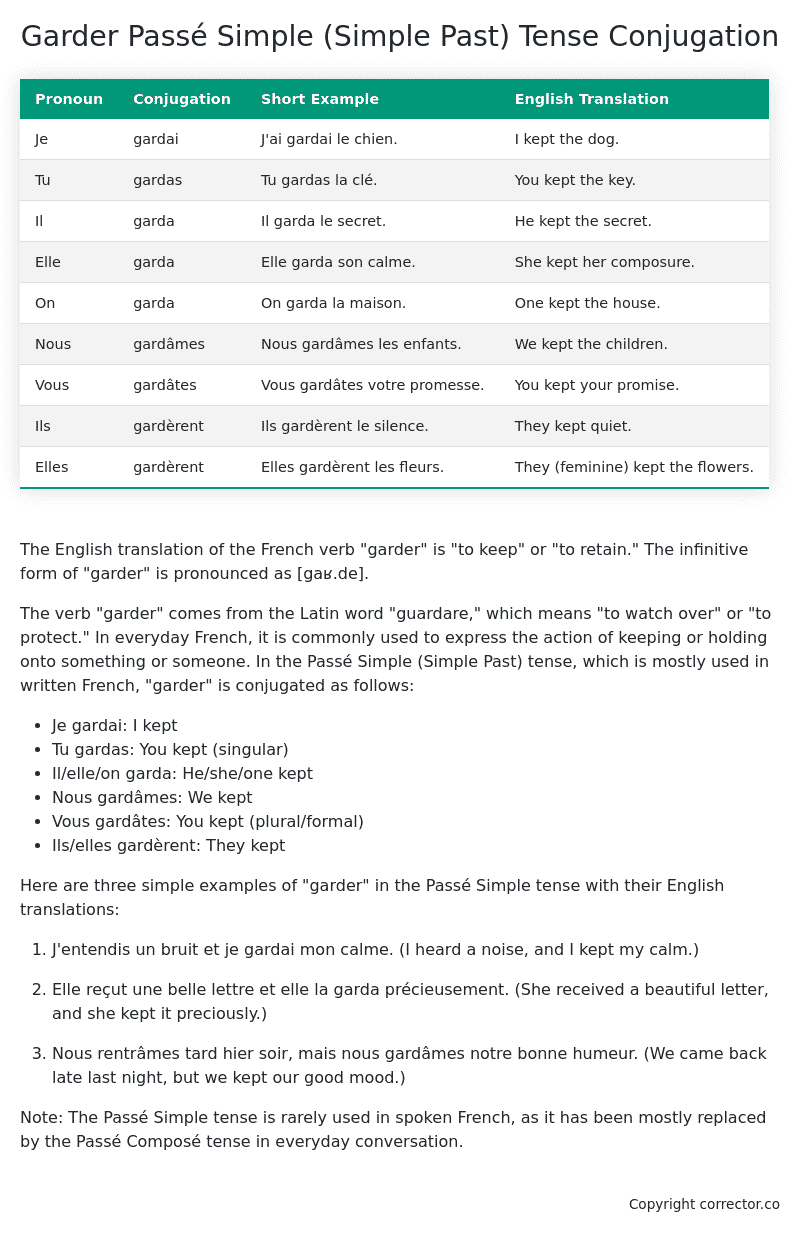Passé Simple (Simple Past) Tense Conjugation of the French Verb garder
Introduction to the verb garder
The English translation of the French verb “garder” is “to keep” or “to retain.” The infinitive form of “garder” is pronounced as [gaʁ.de].
The verb “garder” comes from the Latin word “guardare,” which means “to watch over” or “to protect.” In everyday French, it is commonly used to express the action of keeping or holding onto something or someone. In the Passé Simple (Simple Past) tense, which is mostly used in written French, “garder” is conjugated as follows:
- Je gardai: I kept
- Tu gardas: You kept (singular)
- Il/elle/on garda: He/she/one kept
- Nous gardâmes: We kept
- Vous gardâtes: You kept (plural/formal)
- Ils/elles gardèrent: They kept
Here are three simple examples of “garder” in the Passé Simple tense with their English translations:
-
J’entendis un bruit et je gardai mon calme.
(I heard a noise, and I kept my calm.) -
Elle reçut une belle lettre et elle la garda précieusement.
(She received a beautiful letter, and she kept it preciously.) -
Nous rentrâmes tard hier soir, mais nous gardâmes notre bonne humeur.
(We came back late last night, but we kept our good mood.)
Note: The Passé Simple tense is rarely used in spoken French, as it has been mostly replaced by the Passé Composé tense in everyday conversation.
Table of the Passé Simple (Simple Past) Tense Conjugation of garder
| Pronoun | Conjugation | Short Example | English Translation |
|---|---|---|---|
| Je | gardai | J’ai gardai le chien. | I kept the dog. |
| Tu | gardas | Tu gardas la clé. | You kept the key. |
| Il | garda | Il garda le secret. | He kept the secret. |
| Elle | garda | Elle garda son calme. | She kept her composure. |
| On | garda | On garda la maison. | One kept the house. |
| Nous | gardâmes | Nous gardâmes les enfants. | We kept the children. |
| Vous | gardâtes | Vous gardâtes votre promesse. | You kept your promise. |
| Ils | gardèrent | Ils gardèrent le silence. | They kept quiet. |
| Elles | gardèrent | Elles gardèrent les fleurs. | They (feminine) kept the flowers. |
Other Conjugations for Garder.
Le Present (Present Tense) Conjugation of the French Verb garder
Imparfait (Imperfect) Tense Conjugation of the French Verb garder
Passé Simple (Simple Past) Tense Conjugation of the French Verb garder (You’re reading it right now!)
Passé Composé (Present Perfect) Tense Conjugation of the French Verb garder
Futur Simple (Simple Future) Tense Conjugation of the French Verb garder
Futur Proche (Near Future) Tense Conjugation of the French Verb garder
Plus-que-parfait (Pluperfect) Tense Conjugation of the French Verb garder
Passé Antérieur (Past Anterior) Tense Conjugation of the French Verb garder
Futur Antérieur (Future Anterior) Tense Conjugation of the French Verb garder
Subjonctif Présent (Subjunctive Present) Tense Conjugation of the French Verb garder
Subjonctif Passé (Subjunctive Past) Tense Conjugation of the French Verb garder
Subjonctif Imparfait (Subjunctive Imperfect) Tense Conjugation of the French Verb garder
Subjonctif Plus-que-parfait (Subjunctive Pluperfect) Tense Conjugation of the French Verb garder
Conditionnel Présent (Conditional Present) Tense Conjugation of the French Verb garder
Conditionnel Passé (Conditional Past) Tense Conjugation of the French Verb garder
Conditionnel Passé II (Conditional Past II) Tense Conjugation of the French Verb garder
L’impératif Présent (Imperative Present) Tense Conjugation of the French Verb garder
L’impératif Passé (Imperative Past) Tense Conjugation of the French Verb garder
L’infinitif Présent (Infinitive Present) Tense Conjugation of the French Verb garder
L’infinitif Passé (Infinitive Past) Tense Conjugation of the French Verb garder
Le Participe Présent (Present Participle) Tense Conjugation of the French Verb garder
Le Participe Passé (Past Participle) Tense Conjugation of the French Verb garder
Struggling with French verbs or the language in general? Why not use our free French Grammar Checker – no registration required!
Get a FREE Download Study Sheet of this Conjugation 🔥
Simply right click the image below, click “save image” and get your free reference for the garder Passé Simple tense conjugation!

Garder – About the French Passé Simple (Simple Past) Tense
Formation
Usage
Narration
Historical Context
Interactions with other tenses
Passé Composé
Imparfait
Conditional and Subjunctive
Summary
I hope you enjoyed this article on the verb garder. Still in a learning mood? Check out another TOTALLY random French verb conjugation!


